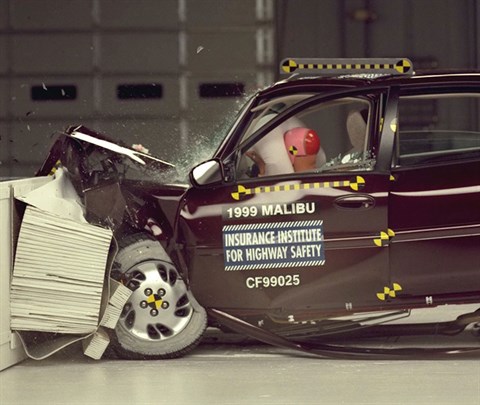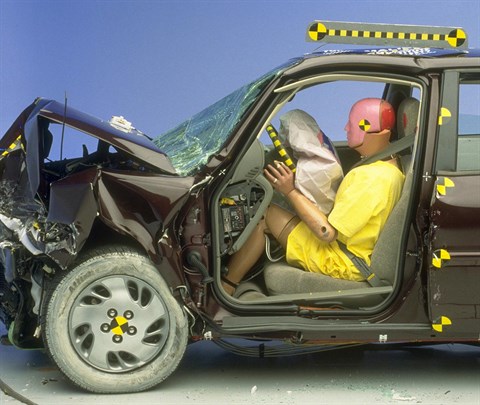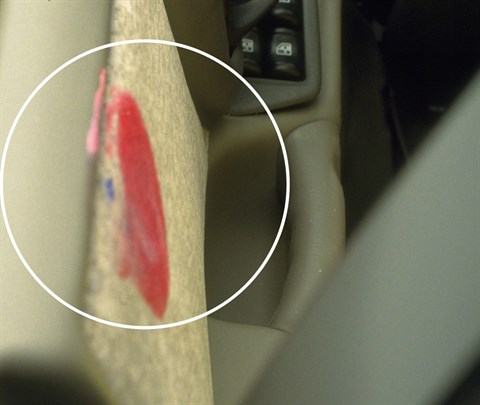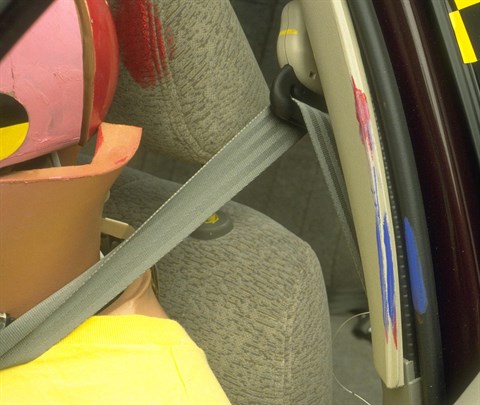Moderate overlap front: original test
Rating applies to 1997-2005 models
Tested vehicle: 1999 Chevrolet Malibu 4-door
The Chevrolet Malibu and the Oldsmobile Cutlass were introduced in the 1997 model year. The Cutlass was discontinued after 1999, and the Malibu was renamed the Classic in the 2004 model year. The Classic was discontinued after 2005. Note: 2004-05 Classics were sold as new cars only to fleets.
| Evaluation criteria | Rating |
|---|---|
| Overall evaluation | |
| Structure and safety cage | |
| Driver injury measures | |
| Head/neck | |
| Chest | |
| Leg/foot, left | |
| Leg/foot, right | |
| Driver restraints and dummy kinematics Dummy movement wasn't well controlled. During rebound, the dummy moved toward the driver door, which had bowed outward, and its head hit the inside of the door below the window sill. Then the head moved up and back and hit the B-pillar. Plus there was too much upward movement of the steering wheel. |
|

Action shot taken during the frontal offset crash test.

The dummy's position in relation to the steering wheel and instrument panel after the crash test indicates that the driver's survival space was maintained reasonably well, although there was too much upward movement of the steering wheel.

Smeared greasepaint shows where the dummy's head hit the inside of the door during rebound.

Smeared greasepaint shows where the dummy's head hit the B-pillar during rebound.
Measures of occupant compartment intrusion on driver side
| Evaluation criteria | Measurement |
|---|---|
| Test ID | CF99025 |
| Footwell intrusion | |
| Footrest (cm) | 18 |
| Left (cm) | 26 |
| Center (cm) | 25 |
| Right (cm) | 16 |
| Brake pedal (cm) | 17 |
| Instrument panel rearward movement | |
| Left (cm) | 11 |
| Right (cm) | 8 |
| Steering column movement | |
| Upward (cm) | 11 |
| Rearward (cm) | 5 |
| A-pillar rearward movement (cm) | 9 |
Driver injury measures
| Evaluation criteria | Measurement |
|---|---|
| Test ID | CF99025 |
| Head | |
| HIC-15 | 466 |
| Peak gs at hard contact | 25 |
| Neck | |
| Tension (kN) | 1.4 |
| Extension bending moment (Nm) | 47 |
| Maximum Nij | 0.40 |
| Chest maximum compression (mm) | 35 |
| Legs | |
| Femur force - left (kN) | 3.7 |
| Femur force - right (kN) | 2.2 |
| Knee displacement - left (mm) | 3 |
| Knee displacement - right (mm) | 2 |
| Maximum tibia index - left | 0.61 |
| Maximum tibia index - right | 0.83 |
| Tibia axial force - left (kN) | 2.4 |
| Tibia axial force - right (kN) | 3.3 |
| Foot acceleration (g) | |
| Left | 68 |
| Right | 107 |
Head restraints & seats
Seat type: Cloth seats
| Overall evaluation | |
|---|---|
| Dynamic rating | |
| Seat/head restraint geometry |
| Seat type | Cloth seats |
|---|---|
| Geometry | |
| Backset (mm) | 60 |
| Distance below top of head (mm) | 90 |
| Seat design parameters | |
| Pass/fail | Fail |
| Max T1 acceleration (g) | 0.0 |
| Head contact time (ms) | |
| Force rating | 0 |
| Neck forces | |
| Max neck shear force (N) | |
| Max neck tension (N) | |
Seat type: Leather seats
| Overall evaluation | |
|---|---|
| Dynamic rating | |
| Seat/head restraint geometry |
| Seat type | Leather seats |
|---|---|
| Geometry | |
| Backset (mm) | 65 |
| Distance below top of head (mm) | 105 |
| Seat design parameters | |
| Pass/fail | Fail |
| Max T1 acceleration (g) | 0.0 |
| Head contact time (ms) | |
| Force rating | 0 |
| Neck forces | |
| Max neck shear force (N) | |
| Max neck tension (N) | |
About the head restraint & seat test
Currently, IIHS tests apply only to front seats.
